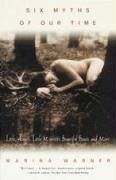Is Jurassic Park a work of covert misogynist propaganda? Does romanticizing childhood lead to abusing children? What secret correspondence links Mary Shelley's Frankenstein to video games and Shakespeare's Caliban to Hannibal Lecter? in what ways do our culture's most hallowed legends inform the current debates over single mothers, the men's movement, and animal rights? In these six dazzlingly intelligent and provocative essays, the distinguished English novelist and critic Marina Warner weaves classical mythology, pop culture, and today's headlines into a potent work of cultural criticism that is both unsettling and entertaining. Ranging from Medeato Thelma and Louise and from myths of cannibalism to the politics of rape, Six Myths of Our Time is at once a celebration of the enduring power of fable and a welcome antidote to its more virulent manifestations in our public life.








